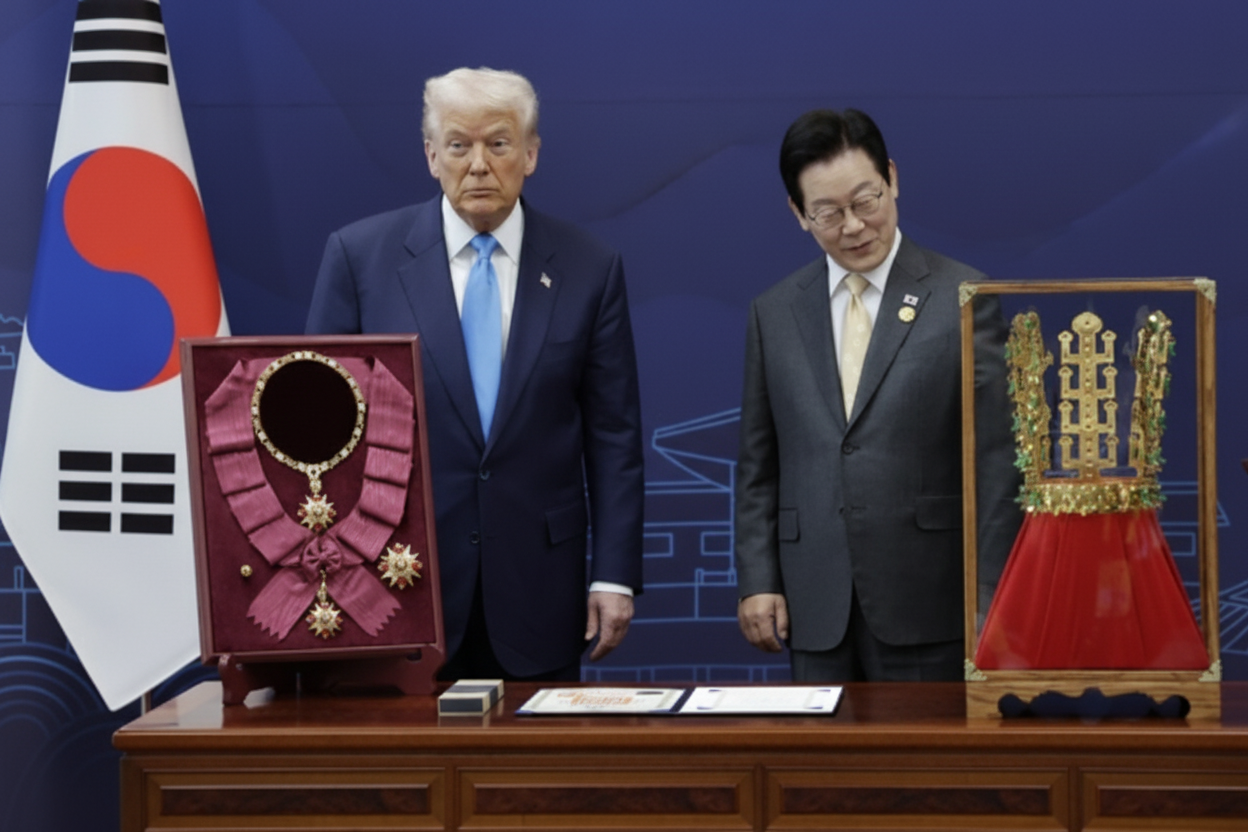Lee Jae-myung Voices Resolve for Korean War's End Despite Missed Kim Jong-un Meeting

US-ROK Summit Held in Gyeongju: Trump Reaffirms Commitment to Korean War's End
On October 29, 2025, a summit between the Republic of Korea (ROK) and the United States took place in the historic city of Gyeongju. U.S. President Donald Trump and ROK President Lee Jae-myung attended, engaging in in-depth discussions on key bilateral issues. This summit served as an important opportunity to strengthen cooperation in various fields, including security and the economy, and, in particular, to reaffirm the two countries' joint efforts for the peaceful settlement of the Korean Peninsula issue. The main agenda items included the U.S.-ROK tariff negotiations, South Korea's investment in the U.S., and the Korean Peninsula peace process. Lee Jae-myung requested Trump's continued interest and cooperation in establishing peace on the Korean Peninsula, emphasizing the U.S.'s role in achieving complete denuclearization and establishing a permanent peace regime on the Korean Peninsula. Furthermore, Lee expressed regret over the failure of a North Korea-U.S. summit to materialize and stated that he would continue to work towards resolving issues through dialogue and diplomacy.
The most notable achievement of this U.S.-ROK summit was the conclusion of the U.S.-ROK tariff negotiations. After months of negotiations, the two countries reached an agreement on October 29, 2025, to lower tariff barriers and promote trade. In particular, automobile tariffs were reduced from 25% to 15%, which is expected to contribute to strengthening the competitiveness of the South Korean automobile industry. This is expected to increase access to the U.S. market for South Korean companies and provide opportunities to export more products. Furthermore, the conclusion of this negotiation is expected to play an important role in further solidifying economic cooperation between the two countries and building mutually beneficial trade relations. However, some critics argue that the tariff reduction is not up to expectations, and it is pointed out that there are areas that need to be improved through additional negotiations.
Another important pillar of economic cooperation is the agreement on South Korea's investment in the United States. The two countries agreed on a total of $350 billion in investment in the U.S., which is expected to contribute significantly to revitalizing the U.S. economy. In particular, $200 billion will be in the form of cash investment, with an annual limit of $20 billion. This investment is expected not only to contribute to the revitalization of U.S. manufacturing and job creation but also to provide new growth engines for South Korean companies. Lee Jae-myung emphasized that this investment in the U.S. will increase the interdependence of the two countries' economies and contribute to strengthening long-term partnerships. Furthermore, Lee stated that he would support South Korean companies investing in the U.S.'s high-tech sectors to promote innovation and foster new industries. However, concerns have also been raised about the impact of large-scale investment on the South Korean economy, and it has been pointed out that efficient management and transparency of investment funds are important.
President Lee Jae-myung also requested U.S. President Donald Trump to provide fuel for nuclear-powered submarines and to revise the U.S.-ROK Atomic Energy Agreement. This is interpreted as part of efforts to strengthen South Korea's security capabilities and secure energy security. Nuclear-powered submarines are characterized by stealth and maneuverability, which can play an important role in strengthening South Korea's naval power. Furthermore, revising the U.S.-ROK Atomic Energy Agreement can contribute to expanding South Korea's autonomy in developing and utilizing nuclear technology. However, it has also been pointed out that these requests could provoke backlash from North Korea and raise concerns about international nuclear non-proliferation efforts. Therefore, there is an opinion that careful review and consultation with the international community are necessary. Trump did not provide a specific answer to Lee Jae-myung's request but expressed his willingness to consider it positively.
This U.S.-ROK summit served as an important opportunity to reaffirm the strong alliance between the two countries and strengthen cooperation in various fields. In particular, the conclusion of the U.S.-ROK tariff negotiations and the agreement on investment in the U.S. are expected to have a positive impact on the two countries' economies. Furthermore, Lee Jae-myung's request for cooperation in establishing peace on the Korean Peninsula and the request for fuel for nuclear-powered submarines and the revision of the U.S.-ROK Atomic Energy Agreement are evaluated as part of efforts to strengthen South Korea's security capabilities and secure energy security. However, there remains regret over the failure of the North Korea-U.S. summit and areas that need to be improved through additional negotiations. It is expected that the two countries will continue to achieve peace and prosperity on the Korean Peninsula and promote common interests through continuous dialogue and cooperation. Attention is focused on what impact the results of this summit will have on the Korean Peninsula situation and how the two countries' relationship will develop.
